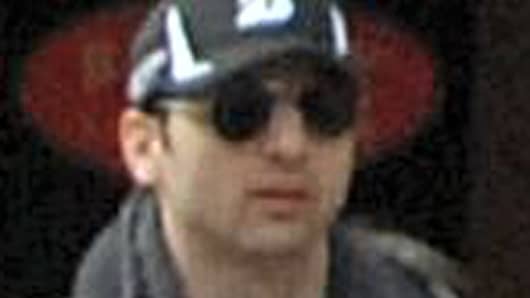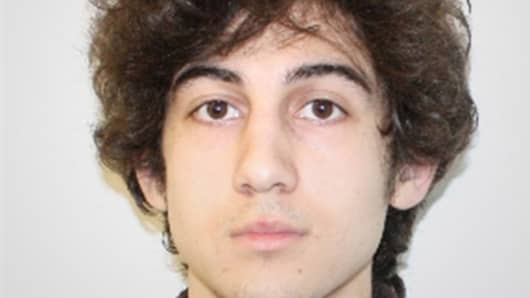With thousands of tips pouring in from the public, investigators for the Federal Bureau of Investigation were homing in on the Boston Marathon bombing suspects on Thursday morning — or so they thought.
By that afternoon, however, the promising leads had collapsed, and officials confronted a risky decision: proceed without the help of the public to avoid tipping off the suspects or publicize images of them and risk driving them deeper into hiding or worse.
F.B.I. officials, who had been debating all week whether to go to the public, were ultimately convinced that they had to release the photographs because the investigation was stalling and bureau analysts had finally developed clear images of the suspects from hours of video footage.
"We were working the videos, and the footage was getting better and better as the week went on, and by Thursday we got a good frontal facial shot," a senior law enforcement official said. "That tipped it
(Read More: 'Back to Normal' After Night of Terror in Boston)
The official added: "With that type of quality photo, there was no doubt about who they were. We had these murderers on the loose, and we couldn't hold back, and we needed help finding them."
The decision — which involved Attorney General Eric H. Holder Jr. and Robert S. Mueller III, the director of the F.B.I. — was one of the most crucial turning points in a remarkable crowd-sourcing manhunt for the plotters of a bombing that killed three people and wounded more than 170.
While the decision to publicize the suspects' identities resulted in the arrest of one of the men, it set in motion a violent string of events that lasted for 26 hours. Over that time, a police officer was killed, one of the suspects died, several officers sustained life-threatening injuries and one of the country's major cities was shut down.
On Saturday morning, the younger of the two suspects, Dzhokhar A. Tsarnaev, 19, remained in serious condition at a Boston hospital. His brother, Tamerlan Tsarnaev, 26, died early Friday after a shootout with the police.
(Read More: Timeline of a Terror Hunt: Last Suspect Captured)
The authorities knew that broadly distributing the images — some captured by ubiquitous surveillance cameras and cellphone snapshots and winnowed down using sophisticated facial-recognition software — would accelerate the digital dragnet, but they did not realize the level of chaos it would create.
Intelligence and law enforcement officials said the authorities in Boston weighed the risks of some mayhem against their growing fear that time was slipping away and that heavily armed and increasingly dangerous men, and possibly accomplices, could wage new attacks in the Boston area or beyond.
Federal authorities involved in the case had briefed administration and Congressional officials on their hopes to arrest the suspects early Thursday without revealing their hand. But those plans vanished by that afternoon.
"We thought we had good leads," the senior law enforcement official said. "We were working on some stuff, and we got to a point where it leveled off, and then there was nothing imminent, so we moved with what we thought would result in identifying them."
The authorities first developed information about the suspects' whereabouts late Thursday when one of them was seen in video footage that was being reviewed from a convenience store in Cambridge that had just been robbed.
(Read More: Who Are the Boston Marathon Bombing Suspects?)
Shortly after the suspects left the convenience store, the authorities received a report that a police officer at the Massachusetts Institute of Technology had been ambushed and killed.
And then, for two hours, there was no sign of the suspects.
It was only after the suspects decided not to kill the owner of a sport utility vehicle that had been carjacked and instead threw him out of his car around 1 a.m. — a decision that ultimately undid their plans to elude the authorities — that they re-emerged on the authorities' radar.
"If he stayed in the car, they could have tried to drive to New Hampshire or something — it would have added some real time to things, which would have been bad and who knows what they would have done," the law enforcement official said. "They were desperate and acting pretty crazy."
The driver called 911, telling the authorities that the two people who had held him up at gunpoint had said they were the marathon bombers. The authorities put out an all-points bulletin for the S.U.V., and officers in Watertown, 10 miles west of Boston, spotted it just minutes later.
A chaotic chase ensued, with the suspects throwing pipe bombs out of the speeding vehicle. Of the five that were thrown, three exploded, injuring several officers.
The suspects were ultimately cornered by the police and, over several minutes, engaged in a shootout in the middle of Watertown. Armed with handguns and long firearms, the suspects injured several officers. The older suspect, who was strapped with explosives, was killed as he approached the officers.
After Tamerlan Tsarnaev was shot, the younger brother — who was low on ammunition — shifted to the driver's seat of the car from the passenger's seat, slammed it into reverse, ran over his brother, sped away and quickly abandoned the vehicle. From that point until he was captured roughly 20 hours later, he was again off the authorities' radar.
It was only at that point that the authorities learned the identities of the suspects. As the authorities and emergency responders were rushing the older brother to the hospital, the F.B.I. used a small portable machine to scan the suspect's fingerprint, and it quickly returned the result: Tamerlan Tsarnaev.
At the hospital, efforts to save his life were unsuccessful.
With a name, the F.B.I. and other investigators began an intensive search of their databases, and agents fanned out across the country to interview family members and others who might have known the suspects. That led the authorities to uncover the files from two years ago revealing a request from the Russian government that the F.B.I. conduct a background check on the older brother to determine if he had been radicalized.
The F.B.I. had determined that he was not a threat, and Tamerlan Tsarnaev traveled to the Dagestan and Chechnya regions of Russia early last year.
By early Friday, Watertown had been transformed into an armed camp, with hundreds of police officers and agents searching house by house, and the Boston area was shut down.
But by 6 p.m. Friday, there was still no sign of the young fugitive, and Gov. Deval Patrick lifted the restrictions.
That order allowed a Watertown resident to go outside for the first time all day, where he spotted blood on a boat in his backyard. He pulled back the tarp on top, peered in and saw a young man covered in blood.
Within minutes, police cars were screaming toward the home. Shots were fired. By 8:45 p.m., Dzhokhar Tsarnaev, whom the authorities believed had suffered a bullet wound at some point in the chaos, was in custody and being rushed to the hospital.



